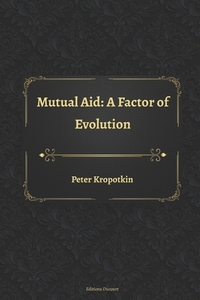Take a photo of a barcode or cover
Two stars thanks to the remarkable examples of mutual aid in the animal kingdom. The rest was utter nonsense, a very one-sided reflection in which individual cases are generalized to prove wrong those who hold other beliefs. The zeal of the author has made him blind I’m afraid.
What also has made this a terrible experience is the quality of the print. Seldom (never?) has this affected my reading experience in such a negative way. Mysterious page breaks. Missing chapters and headers, etc..
What also has made this a terrible experience is the quality of the print. Seldom (never?) has this affected my reading experience in such a negative way. Mysterious page breaks. Missing chapters and headers, etc..
informative
inspiring
reflective
slow-paced
challenging
informative
medium-paced
Kropotkin’s view of evolution as a “progressive” process is inaccurate and obviously the section on “savages” does not age well at all, but I liked the anthropological approach and gained some newfound distaste for the Roman Empire
So relevant that it's easy to forget it was written well over a century ago. In times of despair and hopelessness, this was an unexpected beacon of light and hope. A wonderful antidote to the ravages of uber-individualism.
hopeful
inspiring
reflective
informative
slow-paced
hopeful
informative
inspiring
medium-paced
challenging
informative
slow-paced
Seems like this book was important 100 years ago when Social Darwinism was still a mainstream idea. I do not recommend anybody read this unless they are interested in knowing how people thought about Evolution based on this response.
Read David Graeber instead
Read David Graeber instead
challenging
hopeful
informative
slow-paced
The premise of Mutual Aid: A Factor of Evolution is simple: cooperation is just as significant as competition – if not more so – in ensuring that a species or community thrives. It is a response to social Darwinism, not only as a counter to those regressive “survival of the fittest” ideas, but also as a mirror, in the sense that Kropotkin uses scientific evidence and appeals to nature to grant his philosophy legitimacy, just as those proponents of eugenics and laissez-faire capitalism do. Kropotkin, conscious that his ideas may be dismissed as utopian, makes a point to present them in a very matter-of-fact, common-sense way. He provides countless examples of mutual aid in action in the animal kingdom and in human societies from ancient past to (then-)present. Though this list of anecdotes is kind of tedious and more cursory than I’d like, it is undeniably accessible – far more accessible than, say, Marx, whose writing is riddled with equations and tables of economic statistics.
Despite being an anarchist and therefore very mindful of hierarchy and injustice, Kropotkin does have his blind spots and shortcomings (as do we all). On many occasions Kropotkin would celebrate the solidarity and benevolence of a given group, then casually mention something horrific like women being taken as spoils of war. It’s unclear, in these instances, what his intention is. Does he just not recognise how fucked up this is? Is he trying to make a point about humans being capable of both good and evil? It’s jarring either way, and odd because one of the things I admired in The Conquest of Bread was his consideration of women.
He is somewhat critical of racism, though obviously not as critical as he could be. Throughout the book, Kropotkin uses several terms which today would be considered racial slurs, though he does often put “savage” in quotes, presumably to demonstrate his disapproval of the phrase. He is sceptical of certain claims made about indigenous peoples – he argues that cannibalism emerges in times of scarcity, that “eye for an eye” conceptions of justice are just as prevalent in Western Europe as they are in native tribes, and so on. He also notes that much of what we supposedly know about these tribes comes from the observations of genocidal colonisers. That said, he does agree that the Khoekhoen (not the word he used) are “filthy” and “occupy one of the lowest degrees on the human scale.” He also seems to take empire and colonisation for granted, and his sociological analysis is decidedly Eurocentric.
I don’t think Mutual Aid: A Factor of Evolution is as good as The Conquest of Bread, personally, even though a lot of people say it’s better. I can say this much: I appreciate what Kropotkin was going for.
Graphic: Death, Racial slurs, Racism, Slavery, Violence, Kidnapping, Cannibalism, Colonisation
Moderate: Ableism, Animal death, Child death, Genocide, Sexism, Terminal illness, Murder, War
Minor: Gun violence, Incest, Infidelity, Rape, Suicidal thoughts, Torture, Blood, Pregnancy, Fire/Fire injury, Abandonment
informative
reflective
slow-paced
"...Man is appealed to to be guided in his acts, not merely by love, which is always personal, or at the best tribal, but by the perception of his oneness with each human being. In the practice of mutual aid, which we can retrace to the earliest beginnings of evolution, we thus find the positive and undoubted origin of our ethical conceptions; and we can affirm that in the ethical progress of man, mutual support not mutual struggle- has had the leading part. In its wide extension, even at the present time, we also see the best guarantee of a still loftier evolution of our race."







